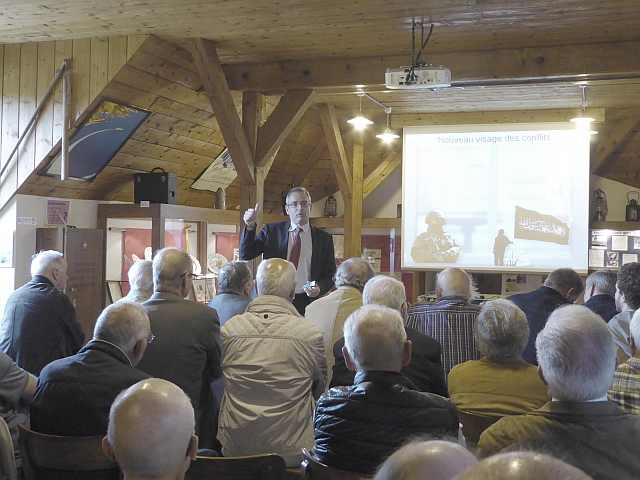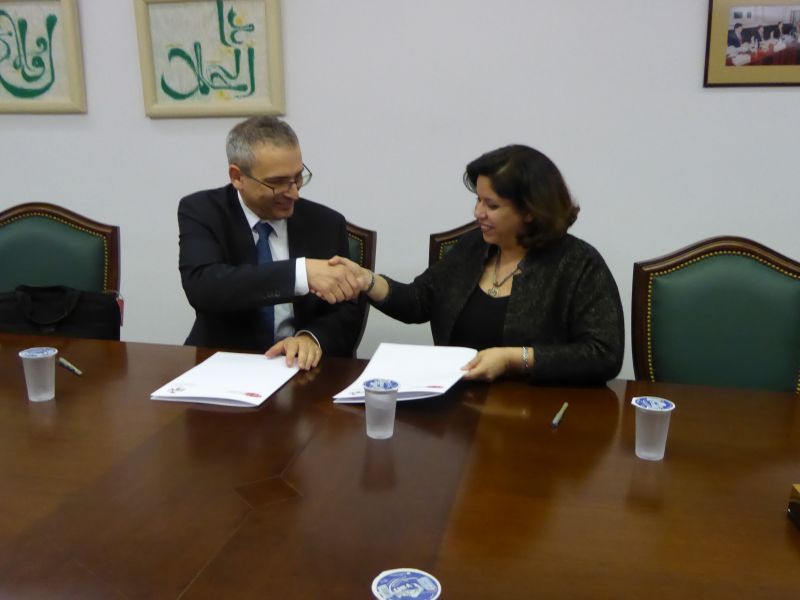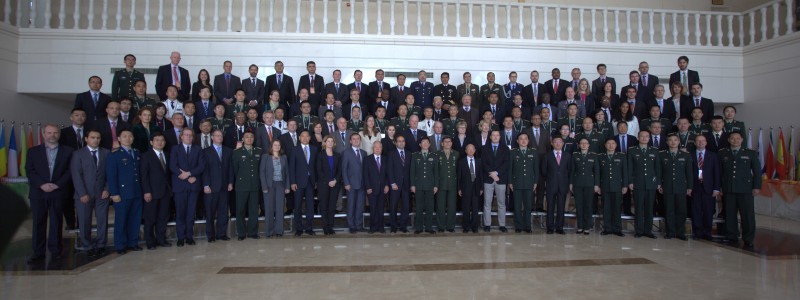![Yes I can smile ! [TWITTER REPOST] Visual impressions from the #GCSP’s Defense Attaché Orientation, a course offered to participants interested Yes I can smile ! [TWITTER REPOST] Visual impressions from the #GCSP’s Defense Attaché Orientation, a course offered to participants interested](https://christianbuehlmann.com/wp-content/uploads/2016/12/45171765ee5f1bee90247be4c4ed48c0-867-900x599.jpg)
![Forgot to Smile [REPOST] Opening The First GCSP Orientation Course for the Defence Attachés in Colombo Forgot to Smile [REPOST] Opening The First GCSP Orientation Course for the Defence Attachés in Colombo](https://christianbuehlmann.com/wp-content/uploads/2016/12/99552797e1630f1fc706d3714ba75745-1e2.jpg)
The First Orientation Course for the Defence Attaché was inaugurated on 5th December, 2016 at KDU, and the Chief Guest of the opening ceremony of the course was HE Mr Heinz Walker Nerkoorn, the Ambassador of Switzerland in Sri Lanka and the event was graced by Air Marshal Kolitha Gunithilaka, the Chief of Defence Staff, Rear Admiral Jagath Ranasinghe, the Vice Chancellor of KDU and many distinguished guests. The course is held from 5th December to 9th December 2016 at the Faculty of Graduate Studies of KDU.

Both brigadier general Naser Al Maihrat and myself held a short welcome message where we stressed the importance of Defence Attaches as trust builders in the current challenging context.
The DA is an instrument of trust building
This course is an important tool of trust building
You are trust builders
{mp4}Jordanian TV on DA course 2016-11-06{/mp4}.
The Jodanian TV broadcasted a small clip showing the opening ceremoniy.

Devant une assemblée attentive d’une quarantaine de persones, Christian Bühlmann a présenté le GCSP comme comme composante de la politique de sécurité suisse. La conférence a été suivie avec attention; les participants ont posé de nombreuses questions pertinentes et la discussion a pu se poursuivre pendant l’apéritif.
Quels sont les points communs entre la solidité du béton
et l’apparente fragilité du verre ?
Quels sont les points communs entre la fenêtre comme camouflage ornemental dessiné sur le toit de la Maison rose
et ces baies vitrées qui laissent entrevoir le Jura et les organisations internationales, mais aussi ces écrans géants qui ont aussi des fenêtres sur des espaces virtuels ?
Ces vitres, ces écrans accueillent le Centre de politique de sécurité de Genève, le GCSP. Et j’affirme que comme les toblerones et les fortins forment une ligne de défense terrestre contre les menaces d’hier, le GCSP forme une nouvelle ligne de défense avancée contre les menaces d’aujourd’hui et de demain.
J’argumente en trois points :
(1) Je rappelle que la ligne de défense est une composante incontournable de la défense suisse, et je montre les limites de la ligne de défense terrestre classique.
(2) Je présente ensuite les éléments du contexte actuel sur la base du nouveau projet de rapport de politique de sécurité, en montrant que les espaces s’étendent et que de nouveaux acteurs sont apparus, et qu’ils imposent de nouvelles réponses.
(3) Je montre ensuite que la Genève internationale en général, le GCSP en particulier, représentent de nouvelles lignes de défense dans la mesure où ils permettent de persuader et inspirer, en Suisse et à l’étranger, les valeurs humanitaires et pacifiques qui caractérisent la Suisse ; de donner une promouvoir des idéaux libéraux et fédéralistes ; de montrer que dans un État qui se base sur des valeurs républicaines, le citoyen et le soldat sont des acteurs incontournables d’une gouvernance démocratique.
…
Le monde a changé ; il nous apparaît plus complexe.
Il nous semble moins lisible.
Nous ne pouvons plus nous baser sur des planifications de défense détaillées, il faut pouvoir réagir avec des solutions modulables. Garder le souvenir de notre passé pour inspirer le futur.
Donner la Suisse non comme modèle, mais comme exemple.
Montrer que nos valeurs pacifiques, libérales et républicaines peuvent inspirer une gouvernance efficace et démocratique.
Être attentif aux les valeurs et les modèles de pensée culturelles des autres pour pouvoir les écouter et les comprendre.
Avoir des lignes de défense dans la profondeur, qui commence par la persuasion, l’inspiration et la compréhension.
Ainsi, le GCSP représente, comme la ligne de la Promenthouse par le passé, une nouvelle ligne de défense incontournable.
Une nouvelle ligne de défense
Le centre de politique de sécurité, Genève,
composante de la politique de sécurité suisse

Both parties have agreed to cooperate in a number of areas related to international peace and security as well as regional issues. They plan to collaborate on training and education, research, and dialogue activities. Their general objectives are to train diplomats and other civil servants in the field of international security, conduct mutually agreed cooperation and projects, as well as activities which will enhance the fulfillment of their respective mandates.
The GCSP has already been working closely during the last decade with the Royal Jordan National College for the organization of the Training Course in Diplomacy and Security Policy for Military Officers and Civil Servants Involved in International Relations, better known as the Defence Attaché Orientation Module. The collaboration with the Jordan Institute of Diplomacy will enhance and complement this cooperation and provide new insight on the Middle East region
The GCSP is engaged in partnerships with numerous leading international organisations, think tanks, and academic institutes to collaborate on a variety of activities aimed at providing forward-thinking and creative solutions in international affairs to individuals and institutions worldwide.
![[REPOST] Defence Attaché Orientation Module: 9th Training Course in Diplomacy and Security Policy – Amman [REPOST] Defence Attaché Orientation Module: 9th Training Course in Diplomacy and Security Policy – Amman](https://christianbuehlmann.com/wp-content/uploads/2015/11/f87fbc910391d7330524962d6e39904f-f4a.jpg)
The GCSP, thanks to funding from the Swiss Federal Department of Defence, Civil Protection and Sport – International Relations Defence (DDPS, IR D), conducted very successfully the “9th Defence Attaché Orientation Module, Training Course in Diplomacy and Security Policy for Military Officers and Civil Servants Involved in International Relations” in the premises of the Royal Jordanian National Defense College in Amman from 8 to 12 November 2015.
It was attended by a wide and rich range of participants from the MENA but also from further abroad. In total there were 34 participants from 16 countries: Australia, Canada, Czech Republic, Egypt, Kazakhstan, , Lebanon, Morocco, Netherlands, Poland, Czech Republic, Saudi Arabia, Slovakia, Switzerland, Tunisia, Turkey, Ukraine and, also, Jordan as the host country (12 participants). Moreover, 10 participants from the War Program and the National Defense Program took part to the courses on a daily basis.
This orientation module was greatly appreciated by acting and future Defence Attachés as it provided a good overview of the multitude of activities such a position entails, as well as an opportunity to exchange views and experiences.
Many speakers brought new insight to the participants, amongst them H. E. Mr Hans-Peter Lenz, Ambassador of Switzerland to Jordan, H. E. Mr Shafaat Ullah Shah, Ambassador of Pakistan to Jordan, and H. E. Mr Mohamed Taisir Bani Yassin, Secretary General, Ministry of Foreign Affairs and Expatriate, Jordan.
Lead by Colonel Urs Amiet, Senior Programme Advisor, Regional Development Programme at the GCSP, the course reached all its aims, which were:
The participants underlined the excellence of the module, the quality of the content, as well as the added value of contacts with participants from the region and beyond.

Around 120 participants from 30 countries and the United Nations, including leading policymakers, practitioners and academics, descended upon the scenic venue situated north of the Chinese capital, ready to exchange experiences, views and ideas on how to overcome obstacles, build capacities and promote the effective implementation of peace operations.
After a tour of the Peacekeeping Centre, where training programs are run for Chinese peacekeepers before deployment, the Challenges Annual Forum was opened by Senior Colonel Zhang Li, Deputy Director-General of the Peacekeeping Affairs Office of the Ministry of National Defense of China and Ms Annika Hilding Nordberg, Director of the Challenges Forum Secretariat, outlining the agenda and setting the tone for the dynamic discussions to follow: while there are many challenges of modern peace operations, they can be overcome by a committed partnership.
The thematic focus for this Annual Forum was « Building Capacity for Peace Operations in Response to Diversifies Threats: What Lies Ahead? » – a topical issue in view of the increased presence of non-traditional threats in many areas where peace operations are deployed.
The chosen theme was also very timely in relation to the upcoming review of the UN peace operations, initiated by the UN Secretary-General Ban Ki-moon last June and to be completed next year. How to enhance the tools and capabilities of the UN peace operations to more effectively meet the challenges in complex security environments will be a central theme for this review. Mr David Haeri, Director of the Policy, Evaluation and Training Division, Departments of Peacekeeping Operations and Field Support in the UN Secretariat, shared the current thinking of the United Nations on these matters.
The challenges posed by the non-traditional threats – such as terrorism, piracy, asymmetric warfare and transnational organized crime – give rise to a number of questions, not only about what strategies, capabilities and skills are needed for peacekeepers to effectively deliver on their mandates, but also how to improve the ability to better face threats directed at the peacekeepers themselves. Two of the sessions were devoted to the above set of questions. Among the issues raised was the need to make better use of modern technology and innovations and to develop strategic partnerships with regional organizations.
A third session took a closer look at the logistical requirements of conducting complex peace operations, in particular in remote areas. As the security threats increasingly take on non-traditional forms and often occur away from urban centers, in locations where the infrastructure is poor, the logistical challenges of undertaking peace operations are becoming more daunting. Also here, the question of how best to provide the right capabilities was addressed, including the need for logistics support for rapid deployment and for robust mandates.
A fourth and final session focused on the issue of partnerships for capacity-building of peacekeepers, both at international, regional and national levels. Among the recommendations put forward was the need to enhance pre-deployment training and training while deployed, to harmonize standards for training program and to promote a more interoperable training system for the peacekeepers.
The distinguished panelists offered insightful and thought-provoking presentations and recommendations, highlighting different aspects of the issues at hand. The interactive discussions in the auditorium were continued over the coffee breaks and at the dining table, the different professional and regional perspectives mixing and synergizing.
The horizons were further expanded by a visit to the Great Wall. A much appreciated tour of the Police Peacekeeping Training Centre in Lanfang was also arranged for the participants in the Challenges Annual Forum. Madam Nancy Gao, Director of the Police Peacekeeping Training Centre, and her team gave a presentation of the training program offered, including a demonstration of exercises by a Formed Police Unit training to be deployed in Liberia next year.
At the end of the Challenges Annual Forum, Major General (ret.) Huang Baifu, Vice Chairman of the China Institue of International Strategic Studies, offered concluding remarks and summarized the main points of the discussions. As pointed out by the hosting nation, the autumn is the season for harvest. Indeed, the Challenges Annual Forum in Beijing produced a rich outcome in terms of ideas, proposals and recommendations, as well as strengthened partnerships and networks among the participants. And most certainly, new seeds have been sown for later harvest in coming years.